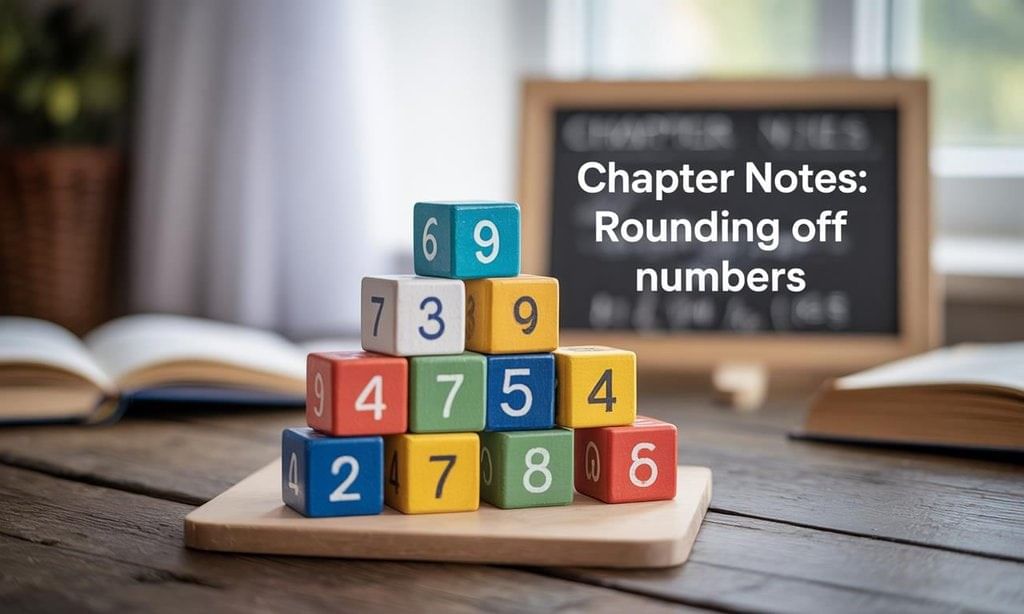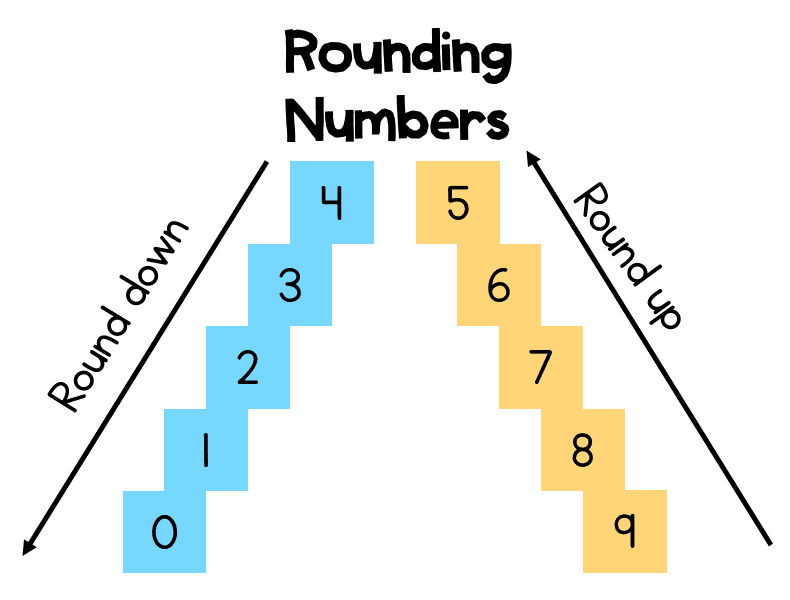Rounding Off Numbers Chapter Notes | Mathematics for Class 5 PDF Download
| Table of contents |

|
| What is Rounding Off? |

|
| Place Value |

|
| Rules to Round Off |

|
| Rounding Off Whole Numbers |

|
| Rounding Off the Large Numbers |

|
| Why Do We Use Rounding? |

|
| Solved Examples |

|

What is Rounding Off?
- Rounding off means changing a number to a simpler number that is close to the original value.
- Example:
Number: 47
Rounding to the nearest ten: 47 is closer to 50 than 40,
So it rounds to 50.
Place Value
To round off numbers, you need to understand place values. Each digit in a number has a place value, such as ones, tens, hundreds, etc.
Ones: The digit in the rightmost place.
Tens: The digit in the second place from the right.
Hundreds: The digit in the third place from the right.
For Example, In the number 536:
6 is in the ones place.
3 is in the tens place.
5 is in the hundreds place.
Rules to Round Off
Step 1: Identify the Place Value
Decide which place value you want to round to (e.g., nearest whole number, nearest ten, nearest hundred).
Step 2: Look at the digit to the right of that place:
1. If it’s 5 or more, round up (add 1 to the digit you’re rounding).
Round Up: Increase the rounding digit by 1 and change all digits to the right to zero.
Examples:
Round 86 to the nearest ten:
The tens digit is 8.
The ones digit is 6.
Since 6 is greater than 5, increase the tens digit by 1 (8 becomes 9).
Result: 90.
2. If it’s less than 5, round down (keep the digit the same).
Round Down: Keep the rounding digit the same and change all digits to the right to zero.
Example:
Round 73 to the nearest ten:
The tens digit is 7.
The ones digit (to the right) is 3.
Since 3 is less than 5, keep the tens digit as 7 and replace the ones digit with 0.
Result: 70

Rounding Off Whole Numbers
(i) Rounding off to the nearest 10
- If the digit in the ones place is 0, 1, 2, 3, or 4 (i.e. < 5) then replace ones place by ‘0

- If the digit in the ones place is 5, 6, 7, 8 or 9 (i.e. > 5 or = 5, but < 10), then replace ones digit by ‘0’ and add 1 to the tens place

(ii) Rounding off to the nearest 100
- If the digit in the tens place is 0, 1, 2, 3, or 4 (i.e. < 5) then replace ones and tens places by ‘0’

- If the digit in the tens place is 5, 6, 7, 8 or 9 (i.e. > 5 or = 5, but < 10), then replace ones and tens places by ‘0’ and add 1 to the hundreds place.

(iii) Rounding off to the nearest 1000
- If the digit in the hundred place is 0, 1, 2, 3, or 4 (i.e. < 5) then replace ones, tens and hundred places by ‘0’.

- If the digit in the hundreds place is 5, 6, 7, 8 or 9 (i.e. > 5 or = 5, but < 10), then replace ones, tens and hundred places by ‘0’ and add 1 to the thousands place.

Rounding Off the Large Numbers
(i) Rounding off to the nearest 10,000
- If the digit in the thousands place is 0, 1, 2, 3, or 4 (i.e. < 5) then replace ones, tens, hundred and thousand places by ‘0’.

- If the digit in the thousands place is 5, 6, 7, 8 or 9 (i.e. > 5 or = 5, but < 10), then replace ones, tens, hundred and thousands places by ‘0’ and add 1 to the ten thousands place.

(ii) Rounding off to the nearest 1,00,000
- If the digit in the ten thousands place is 0, 1, 2, 3, or 4 (i.e. < 5) then replace ones, tens, hundred, thousand and ten thousand places by ‘0’.

- If the digit in the ten thousands place is 5, 6, 7, 8 or 9 (i.e. > 5 or = 5, but < 10), then replace ones, tens, hundreds, thousands and ten thousands places by ‘0’ and add 1 to the lakh place.

Why Do We Use Rounding?
Rounding helps us in real life! Here are some examples:
Shopping: If a toy costs ₹198, you can round it to ₹200 to estimate quickly.
Counting: If you have 342 pencils, you can say “about 300” to make it easier.
Time: If it’s 7:53, you might say it’s “about 8:00” to keep things simple.
Fun Example:
You’re buying 47 apples.
To estimate the cost, round 47 to 50.
If each apple costs ₹10, you can quickly guess the total as 50 × ₹10 = ₹500.
Solved Examples
Example 1: Round 347 to the nearest ten.
Ans: 350
Sol:
Step 1: Look at the digit in the ones place (7).Step 2: Since 7 is more than 5, we round up.
Therefore the answer rounds up to 350
Example 2: Round 223 to the nearest hundred.
Ans: 200
Sol:
Step 1: Look at the digit in the tens place (3).
Step 2: Since 2 is less than 5, we round down.
Therefore the answer rounds down to 200.
Example 3: Round 12,345 to the nearest thousand.
Ans: 12000
Sol:
Step 1: Look at the digit in the hundreds place (3).
Step 2: Since 3 is less than 5, we round down.
Therefore 12,345 rounds down to 12,000.
Example 4: Round 876,543 to the nearest hundred thousand.
Ans: 900,000
Sol:
Step 1: Look at the digit in the ten thousand place (7).
Step 2: Since 7 is 5 or more, we round up.
Therefore , 876,543 rounds up to 900,000.
|
95 videos|462 docs|47 tests
|
FAQs on Rounding Off Numbers Chapter Notes - Mathematics for Class 5
| 1. How do you round off large numbers? |  |
| 2. Why is rounding off numbers important? |  |
| 3. Can you round off whole numbers? |  |
| 4. What is the purpose of rounding off numbers in real-life applications? |  |
| 5. How can rounding off numbers help in making quick estimates? |  |
























